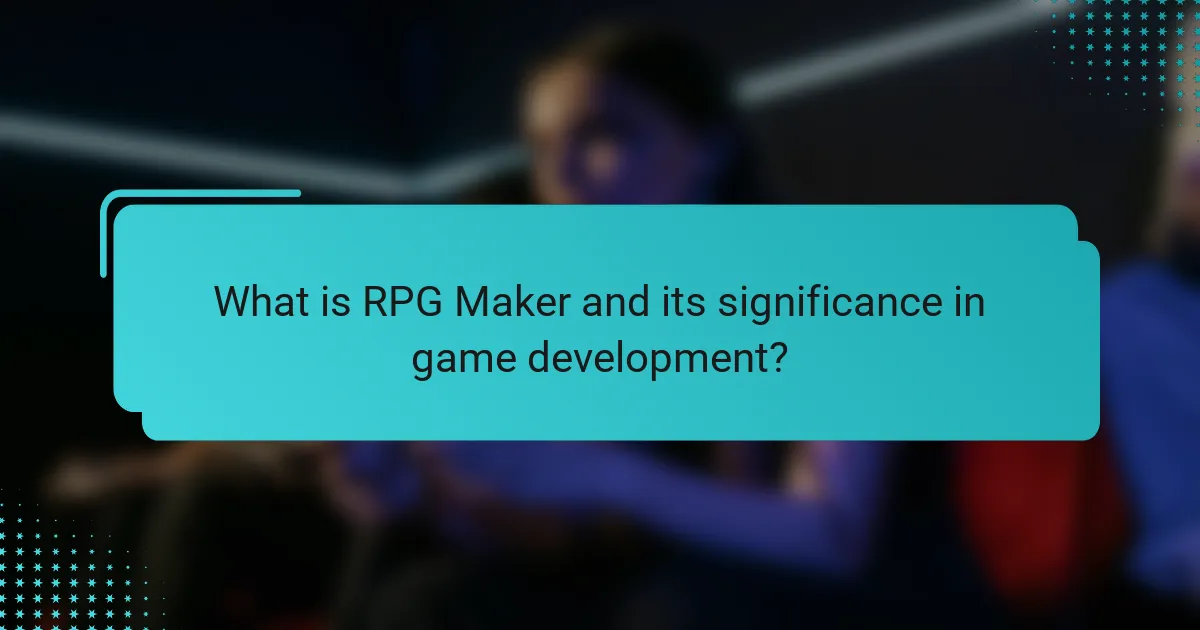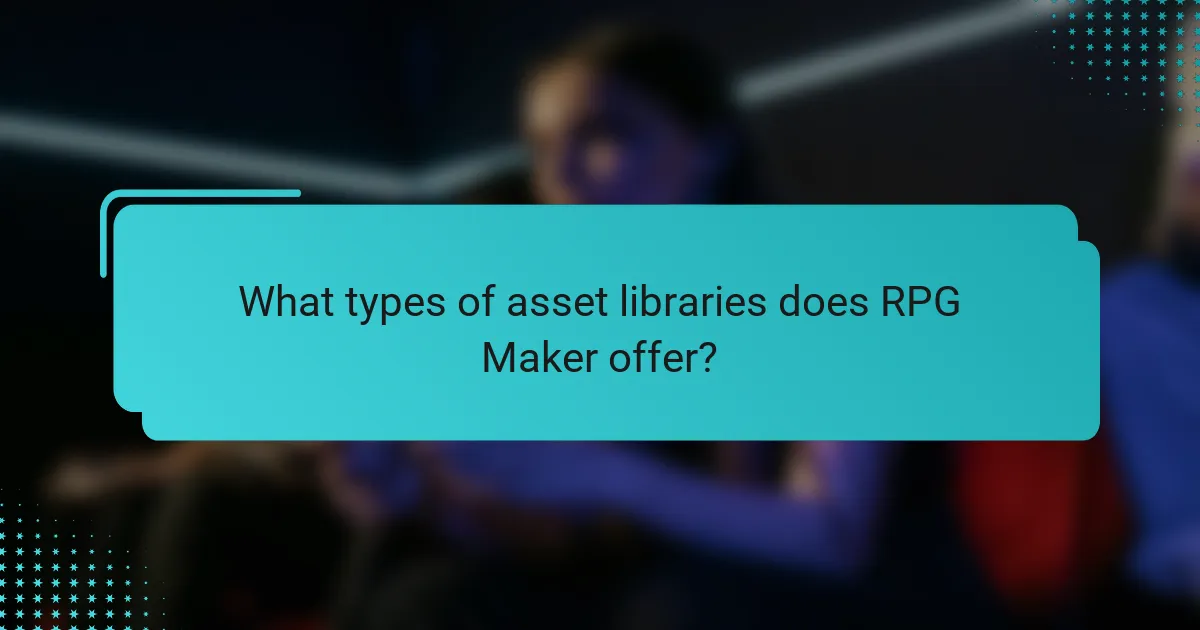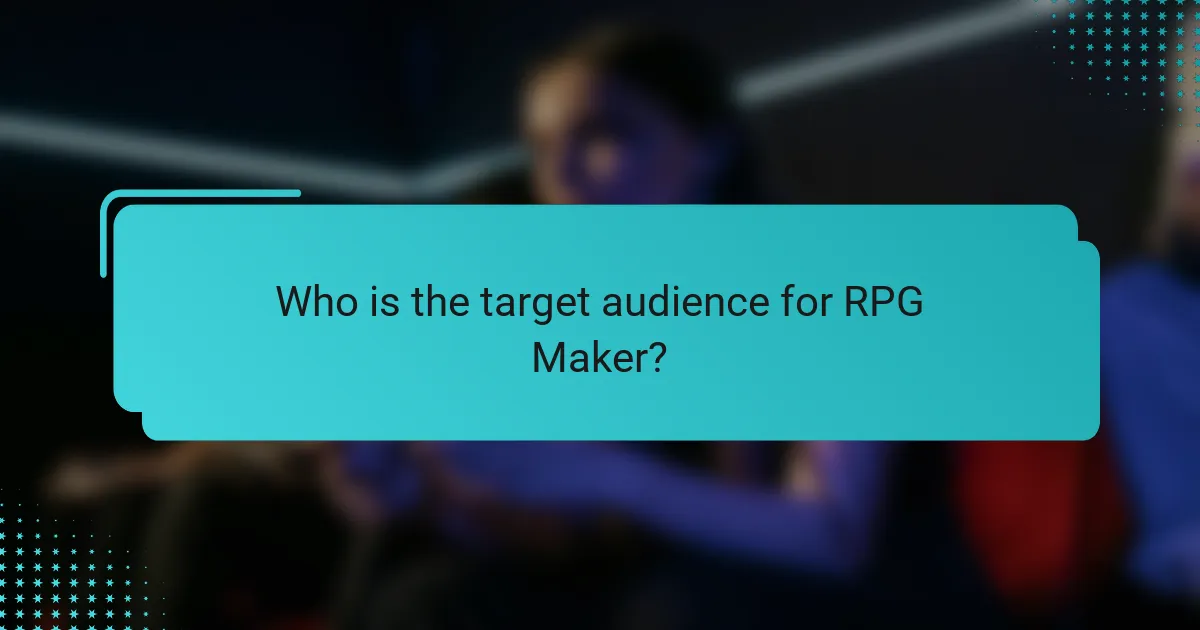
What is RPG Maker and its significance in game development?
RPG Maker is a game development software designed for creating role-playing games. It allows users to build games without extensive programming knowledge. The software provides a user-friendly interface and various tools for designing characters, maps, and events. RPG Maker has been significant in democratizing game development. It enables hobbyists and aspiring developers to bring their ideas to life. Since its initial release in 1988, it has fostered a community of creators. Many successful indie games have emerged from RPG Maker, showcasing its impact on the gaming industry.
How does RPG Maker facilitate the creation of role-playing games?
RPG Maker facilitates the creation of role-playing games through its user-friendly interface and extensive asset libraries. The software allows users to design games without needing extensive programming knowledge. It provides a drag-and-drop functionality for map creation and event management. RPG Maker includes pre-built character sprites, tilesets, and sound effects. Users can also customize these assets or import their own. The platform supports various gameplay mechanics, including turn-based combat and quest systems. Additionally, RPG Maker offers scripting capabilities for advanced users to enhance functionality. This combination of features makes it accessible for beginners while still offering depth for experienced developers.
What are the key features that define RPG Maker’s functionality?
RPG Maker’s key features include a user-friendly interface, event scripting, and customizable assets. The user-friendly interface allows creators to design games without extensive programming knowledge. Event scripting enables complex game mechanics and interactions through a visual editor. Customizable assets include graphics, music, and sound effects, which can be imported or modified. Additionally, RPG Maker supports multiple game genres and styles. The platform also provides a built-in map editor for level design. Finally, it offers a community-driven marketplace for sharing and acquiring resources. These features collectively empower users to create diverse and engaging RPGs.
How does RPG Maker compare to other game development platforms?
RPG Maker is user-friendly and specifically designed for 2D role-playing games. It allows users to create games without extensive programming knowledge. In comparison, platforms like Unity and Unreal Engine offer broader capabilities for 3D games and complex mechanics. RPG Maker’s asset library is extensive but limited to 2D assets, while Unity and Unreal support both 2D and 3D assets. RPG Maker focuses on storytelling and character development, appealing to indie developers and hobbyists. Other platforms cater to a wider audience, including professional game developers. RPG Maker’s simplicity makes it accessible, but it lacks the advanced features of its competitors.
What customization options are available in RPG Maker?
RPG Maker offers various customization options for game development. Users can modify character sprites, tilesets, and backgrounds. The software allows for the creation of custom scripts using JavaScript. Additionally, users can adjust game mechanics through event commands. RPG Maker supports the import of audio files for unique soundtracks. Users can also create custom user interfaces and menus. The software provides a database for managing game data, including items and enemies. These options enable developers to create tailored gaming experiences.
How can users personalize their game mechanics and aesthetics?
Users can personalize their game mechanics and aesthetics through various customization options in RPG Maker. They can modify gameplay elements such as character abilities, enemy behaviors, and item effects. This allows for unique gameplay experiences tailored to user preferences. Aesthetically, users can alter graphics, sound, and user interface elements. They can import custom assets including sprites, tilesets, and music tracks. RPG Maker provides a user-friendly interface for these modifications, enabling creators to implement changes easily. The flexibility of the engine supports diverse styles and themes, enhancing user creativity.
What types of scripting and programming options does RPG Maker provide?
RPG Maker provides several scripting and programming options, primarily through its built-in scripting language and event system. The scripting language, known as Ruby in older versions and JavaScript in RPG Maker MV and MZ, allows for custom game mechanics and features. Users can modify game behavior by writing scripts that interact with game objects and events.
Additionally, RPG Maker supports a visual event editor. This editor allows users to create complex interactions without needing to write code. Users can set conditions, triggers, and actions through a user-friendly interface. RPG Maker also allows for plugins to extend functionality, particularly in MV and MZ versions. These plugins are often created by the community and can enhance gameplay, graphics, and user interface elements.
Overall, RPG Maker combines scripting, visual programming, and plugin support, providing a flexible environment for game development.

What types of asset libraries does RPG Maker offer?
RPG Maker offers several types of asset libraries. These include graphics, audio, and animations. The graphics library contains character sprites, tilesets, and backgrounds. The audio library features sound effects and music tracks. Animations include battle animations and special effects. Each library is designed to enhance game development. Users can access these assets to create unique gaming experiences. The libraries are regularly updated with new content. This ensures a diverse range of options for developers.
How can users access and utilize asset libraries in RPG Maker?
Users can access and utilize asset libraries in RPG Maker through the software’s built-in resource manager. The resource manager allows users to browse, import, and manage various assets such as graphics, audio, and animations. Users can access free assets from the RPG Maker official website or third-party sites. To import assets, users simply drag and drop files into the resource manager. RPG Maker supports various file formats including PNG for images and OGG for audio. Once imported, users can assign assets to characters, tilesets, or events within their game. This functionality enhances game customization and creativity. The availability of both free and paid assets broadens the options for users.
What kinds of assets are included in RPG Maker’s libraries?
RPG Maker’s libraries include various types of assets. These assets consist of graphics, audio, and scripts. Graphics encompass character sprites, tilesets, and backgrounds. Audio assets include sound effects and music tracks. Scripts allow for additional functionality and customization in games. Each asset type serves to enhance the gaming experience. The libraries are designed to support game developers in creating unique RPGs.
How do asset libraries enhance the gaming experience?
Asset libraries enhance the gaming experience by providing developers with a wide range of pre-made assets. These assets include graphics, sound effects, and animations. Utilizing asset libraries saves time, allowing developers to focus on gameplay mechanics. This efficiency can lead to faster game development cycles. Additionally, asset libraries offer diverse styles, catering to various themes and genres. This variety helps developers create visually appealing and immersive environments. Studies show that high-quality visuals significantly improve player engagement. Therefore, asset libraries contribute to a richer and more enjoyable gaming experience.
What are the benefits of using custom assets in RPG Maker?
Custom assets in RPG Maker enhance the game’s uniqueness and player engagement. They allow developers to create a distinct visual and auditory experience. This customization leads to a stronger connection between players and the game. Unique assets can reflect the game’s theme more accurately. They also enable storytelling through personalized graphics and sounds. Furthermore, custom assets can differentiate a game in a crowded market. This differentiation can attract more players and increase sales. Studies indicate that unique content significantly boosts player retention and satisfaction.
How can custom assets improve game uniqueness and appeal?
Custom assets enhance game uniqueness and appeal by providing distinctive visual and auditory elements. These assets allow developers to create a specific atmosphere and style that sets their game apart from others. Unique character designs, environments, and soundtracks contribute to an immersive experience. Players are more likely to engage with games that offer fresh aesthetics and original content. Custom assets can also reflect the game’s narrative and themes, making it more relatable to the target audience. According to a study by the International Journal of Game Design, games with personalized assets have higher player retention rates. This indicates that the use of custom assets directly correlates with increased player interest and satisfaction.
What are the best practices for creating and integrating custom assets?
Best practices for creating and integrating custom assets include defining clear specifications for the assets. This ensures alignment with the project’s aesthetic and functional needs. Use high-quality graphics and audio to enhance user experience. Organize assets in a structured manner within the project folder. This simplifies access and integration during development. Test assets thoroughly in various scenarios to ensure compatibility. Documentation should accompany each asset to provide guidance on usage. Regularly back up your assets to prevent data loss. Following these practices leads to a more efficient development process and a polished final product.

Who is the target audience for RPG Maker?
The target audience for RPG Maker includes aspiring game developers and hobbyists. These individuals often seek tools to create their own role-playing games. RPG Maker appeals to those with limited programming skills. It provides a user-friendly interface for game creation. Additionally, it attracts artists and storytellers wanting to bring their narratives to life. Many users are fans of indie games and retro gaming aesthetics. The platform has a strong community that supports sharing and collaboration. This audience values creativity and accessibility in game development.
What demographics are most likely to use RPG Maker?
The demographics most likely to use RPG Maker include young adults and teenagers, primarily aged 15 to 30. This age group often has an interest in gaming and game development. Many users are aspiring game developers or hobbyists looking to create their own games. The platform appeals to individuals with a passion for storytelling and creativity. Additionally, RPG Maker attracts users who prefer 2D game design due to its accessible tools. Many users also come from communities focused on indie game development. Research indicates that the majority of RPG Maker users are male, although female users are increasingly participating. This trend reflects a growing interest in game creation among diverse demographics.
How do different user groups leverage RPG Maker for game development?
Different user groups leverage RPG Maker for game development by utilizing its accessible tools and features. Hobbyists often use RPG Maker to create simple, narrative-driven games. They benefit from the user-friendly interface and pre-made assets. Indie developers leverage RPG Maker’s flexibility for more complex projects. They customize scripts and graphics to create unique gameplay experiences. Educators use RPG Maker as a teaching tool. It helps students learn game design and storytelling. Each user group finds value in RPG Maker’s community support and extensive tutorials. This versatility contributes to its popularity across diverse demographics.
What skills are beneficial for users of RPG Maker?
Users of RPG Maker benefit from skills in programming, storytelling, and graphic design. Programming skills allow users to create custom scripts and enhance game mechanics. Storytelling skills help in developing engaging narratives and character arcs. Graphic design skills enable users to create or modify assets for a unique visual style. Familiarity with game design principles is also advantageous. Understanding user experience can improve gameplay and interface design. Knowledge of sound design enhances the overall atmosphere of the game. Collaboration skills are beneficial for working with others on projects.
How can beginners get started with RPG Maker effectively?
Beginners can get started with RPG Maker effectively by following a structured approach. First, they should download and install the software from the official website. RPG Maker offers a user-friendly interface that simplifies game creation. After installation, beginners should explore the tutorials available within the program. These tutorials provide step-by-step guidance on basic functions.
Next, they should familiarize themselves with the asset libraries included in RPG Maker. These libraries contain pre-made graphics, music, and sound effects that can enhance their games. Beginners should also experiment with the customization options to create unique game elements.
Additionally, joining online communities and forums can provide valuable support and feedback. Engaging with experienced users can help beginners overcome challenges. Lastly, starting with small projects allows for gradual learning and skill development. This approach builds confidence and understanding of RPG Maker’s capabilities.
What resources are available for learning RPG Maker?
Resources available for learning RPG Maker include official documentation, online tutorials, and community forums. The official RPG Maker website offers comprehensive guides and manuals. YouTube features numerous video tutorials covering various aspects of game development with RPG Maker. Websites like RPG Maker Web and forums such as RPGMaker.net provide community support and shared resources. Additionally, platforms like Udemy offer structured courses specifically for RPG Maker. These resources collectively help users understand the software and develop their games effectively.
What are some common challenges faced by RPG Maker users?
RPG Maker users commonly face challenges related to limited customization options. The software provides a user-friendly interface but restricts advanced modifications. Users often struggle with asset compatibility, as not all assets work seamlessly together. Learning the scripting language can be daunting for beginners. Additionally, creating unique game mechanics often requires extensive knowledge of eventing and scripting. Debugging can be time-consuming, leading to frustration. Users also report challenges in balancing gameplay elements effectively. Finally, finding high-quality assets in the library can be difficult, impacting the overall game quality.
How can users troubleshoot issues in RPG Maker?
Users can troubleshoot issues in RPG Maker by following a systematic approach. First, they should check for software updates to ensure they are using the latest version. Next, users can review error messages that appear during gameplay or design. Understanding these messages can guide them to the specific issue.
Additionally, users should consult the RPG Maker forums and community for similar problems and solutions. Many users share their experiences and fixes for common issues. It is also beneficial to test the project on different devices to identify compatibility issues.
Finally, users can reset their project settings to default if problems persist. This can often resolve conflicts caused by custom modifications. By following these steps, users can effectively address and resolve issues encountered in RPG Maker.
What tips can help improve the RPG Maker experience?
Utilizing RPG Maker effectively requires several key strategies. First, familiarize yourself with the software’s interface and tools. This enhances navigation and speeds up the development process. Second, explore the asset libraries thoroughly. Accessing diverse assets can enrich your game’s visuals and sound. Third, consider customizing existing assets. Tailoring them to fit your game’s theme increases originality. Fourth, engage with the RPG Maker community. Sharing insights and receiving feedback can improve your project significantly. Fifth, plan your game structure before development. A clear outline helps maintain focus and coherence. Lastly, regularly test your game during the development phase. This practice identifies bugs and improves gameplay experience. Each of these tips contributes to a more enjoyable and successful RPG Maker experience.
RPG Maker is a game development software specifically designed for creating 2D role-playing games, catering to users with limited programming knowledge. The article explores RPG Maker’s customization options, extensive asset libraries, and its target audience, which primarily includes aspiring developers and hobbyists aged 15 to 30. Key features such as a user-friendly interface, event scripting, and customizable assets facilitate game creation, while the community-driven marketplace enhances resource availability. Additionally, the article addresses common challenges users face and offers tips for improving the RPG Maker experience, making it a valuable tool for both beginners and experienced developers.